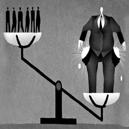Рассмотрено сегодняшнее социальное неравенство. Показано, что основной конфликт состоит в антагонизме между над-территориальной элитой и остальными группами и индивидами, локализованными в процессе глобализации. Сопротивление против глобализма ищет выход в национализме, рискуя уклониться от основного вопроса о справедливости. Конечно, справедливость нельзя установить уравниловкой и эгалитаристское общество невозможно. Если Маркс поддерживает равенство всех, то это непостижимый идеал, так как он предоставляет привилегии автономии за счет гетерономии. Гетерономия не обязательно деспотизм. Она может быть заботой и ответственностью за другого/других. Тогда сама автономия (свобода) меняет свой смысл: она уже не самореализация, не беспредел и произвол, а посвященность другим в конкретной связи с ними.
Social inequality today, or In what Marx's theory has become outdated?
This article discusses the current social inequality. We provides argumentation in support of the idea that the principle social conflict today is the antagonism between the extra-territorial elite, on the one hand, and all groups and individuals who are localized by the globalization, on the other. Opposition to globalizm tries to resolve the above conflict with the help of nationalism. This approach, however, risks missing the fundamental issue of justice. Of course, justice cannot be established through leveling and an egalitarian society is impossible. If Marx insists on equality of everybody, this is an impossible ideal because it privileges autonomy at the expense of heteronomy. Heteronomy is not by necessity despotism. It can be care and responsibility for other/others. In this case, autonomy (freedom) changes its sense and purposefulness. Along these lines, autonomy is not anymore self-realization, mayhem, and arbitrariness but dedication to the others in a concrete link with them.
 Ранний опыт государственного строительства большевиков и Конституция РСФСР 1918 года
Ранний опыт государственного строительства большевиков и Конституция РСФСР 1918 года
 7
7
 25458
|
Официальные извинения
25458
|
Официальные извинения
 972
972
 106229
|
Становление корпоративизма в современной России. Угрозы и возможности
106229
|
Становление корпоративизма в современной России. Угрозы и возможности
 239
239
 85138
85138

